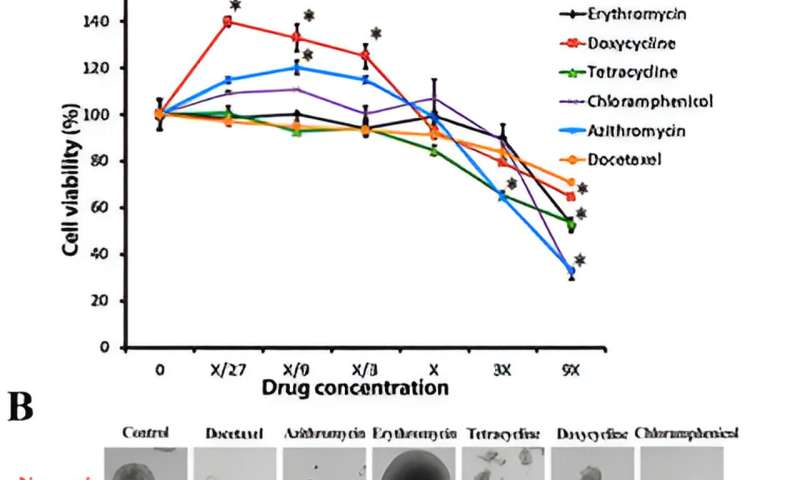Scientists find mechanisms of decreased antibiotic efficacy against breast cancer

A paper saw light in International Journal of Molecular Sciences.
Head of the Laboratory of Translational Oncology Regina Miftakhova comments, "Tumor stem cells are an extremely rare population of cells in a tumor mass, but it is a subpopulation of these cells that has been associated with the development of drug resistance and metastatic process, which lead to disease recurrence and death of patients." This is especially pertinent keeping in mind that breast cancer is the primary cause of death in women among tumor ailments.
It has been shown earlier by overseas studies that antibiotics may decrease the activity of tumor stem cells by suppressing mitochondrial biogenesis.
"This unique characteristic of the drugs can be used to create new effective therapy regimens for breast cancer. The chemotherapeutic compounds used today to treat breast cancer kill actively dividing tumor cells with little or no effect on tumor stem cells. Antibiotics may complement the effect of chemotherapeutic compounds by targeting stem cells, potentially reducing the risk of metastasis and disease recurrence," opines Albert Rizvanov, Head of the Center for Personalized Medicine.
This new paper reveals that hypoxia in fast-growing tumors influences the efficacy of antibiotics.
"Previously, hypoxia inside a tumor was difficult to recreate in vitro, making it difficult to study its effect on drug-tumor cell interactions. Thanks to a unique hypoxia station that was made specifically for our research, we were able to simulate a tumor in the mammary gland," explains Research Associate Almaz Akhunzianov.
The team found that hypoxia conditions can weaken the inhibitory effect of antibiotics on a subpopulation of tumor stem cells in a model of breast cancer. Moreover, the spectrum of changes depended on the type of drug used. For example, the antibiotics doxycycline and erythromycin retained the ability to inhibit the division of tumor stem cells, but did not cause the death of normal tumor cells present in the culture. Meanwhile, azithromycin, another commonly used antibiotic, had no effect on tumor stem cell division. And some of the drugs, including chloramphenicol, caused an increase in the expression level of a marker of therapeutic resistance.
"This discovery provides new insights into how tumor growth conditions (particularly hypoxia) can affect the efficacy of drugs, in this case antibiotics. Antibiotics can be useful in the treatment of cancer, but we must consider the stage of the disease, the dynamics of tumor growth, and the unique characteristics of the microenvironment in which tumor cells reside," concludes Akhunzianov.
In the future, the scientists plan to study how hypoxia and the peculiarities of the tumor microenvironment affect the effectiveness of drugs and cancer treatment methods. They hope that their scientific results will help to develop new, more effective methods of cancer treatment that take into account the unique conditions in which tumor cells are located.
More information:
Unravelling the Therapeutic Potential of Antibiotics in Hypoxia in a Breast Cancer MCF-7 Cell Line Model
www.mdpi.com/1422-0067/24/14/11540
Provided by Kazan Federal University